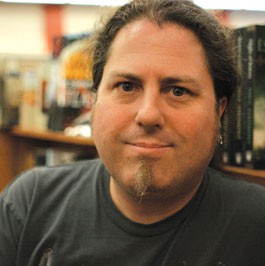All hail Cthulhu! For one day, when the stars are right, Cthulhu—the enormous, octopus-headed god-monster who sleeps at the bottom of the Pacific Ocean—will awaken, rise up and eat all of humanity.
So wrote the great H. P. Lovecraft, whose celebrated 1930s tales of alien creatures and insane cults continue to inspire science fiction and horror writers into the present.
They include Petaluma writer-editor Ross Lockhart.
“I came to Lovecraft indirectly, more from the side than straight on,” says Lockhart, whose new volume, The Book of Cthulhu, has just been published by Night Shade Books. “When I was about 11 or 12 years old,” he recalls, “I was really into Dungeons and Dragons, and the D&D people published an encyclopedia titled Gods and Demigods.” In the first edition of that much-revered tome, there was a section devoted to the Lovecraft mythos, with descriptions of creepy-crawly alien gods with names like Cthulhu, Hastur and Nyarlathotep, illustrated by Errol Otis. “I was totally blown away,” Lockhart says.
A friend recommended T. E. D. Kline’s Lovecraft-inspired short story “Black Man with a Horn,” one of the tales Lockhart has included in The Book of Cthulhu. “It’s an amazingly chilling story,” Lockhart says. “It’s a horror story that does everything right. It’s smart and literary, and it causes the hair on the back of the neck to stand up. Reading that story started the Lovecraft ball rolling for me. Eventually, I checked out some actual Lovecraft—and I was hooked.”
What is now called the Cthulhu mythos all began in 1926 when Lovecraft, known for somewhat sensational shock-filled fiction, wrote a story titled “The Call of Cthulhu.” Published two years later in the magazine Weird Tales, the story caused a stir among readers and immediately inspired other writers.
“‘The Call of Cthulhu’ is so well-written; it’s just layer after layer after layer,” Lockhart says.
Lovecraft went on to create a whole cosmology of weird alien gods, writing stories that developed from the basic bump-in-the-night scary stories to more sophisticated tales. During his life, Lovecraft encouraged other authors to take his ideas and run with them. In time, those writers became known as the Lovecraft Circle.”
Cthulhu’s tentacled grasp continues to capture writers.
“The Book of Cthulhu represents the best of the last 35 years of Cthulhu mythos short fiction,” says Lockhart, who read hundreds of stories in the process of choosing the 27 that make up the book. “I was looking for stories that really stood on their own, that weren’t just pastiches. Because it’s pretty easy to throw in a monster and use words like ‘Cthulhu’ and ‘eldritch’ and ‘squamous,’ and just kind of imitate Lovecraft. But I was looking for stories that stood on their own, that brought something new to the mythos.
“These 27 stories,” he says, “comment on the mythos in an intelligent, sometimes comedic way. And they all give you that delicious shiver that a good horror story should give.”
‘The Book of Cthulu’ is available at your local independent bookseller.









